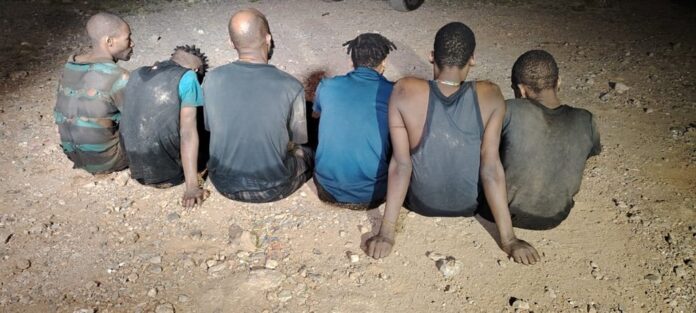Six muddied and bruised Mozambican nationals emerged from Shaft 10 Buffels in Stilfontein in South Africa in the early hours of Friday, 6 December, their ordeal a chilling testament to the brutal realities of illegal mining in South Africa.
These six men, arrested at approximately 00:20, are the latest to resurface following a police crackdown, Operation Vala Umgodi, that has seen over 1387 illegal miners emerge since August. Their story, recounted in harrowing detail, exposes a world of hunger, exploitation, and fear deep beneath the surface.
Dressed in sodden, tattered clothing, and with only two of the six wearing shoes, the men spoke to News24 of their desperate escape from Shaft 11, where they had toiled since August. They had been working as zama zamas since 2020, they said, initially drawn by the promise of providing for their families back in Mozambique. But that promise had long since soured.
“We travelled for three days without food. We survived by eating cockroaches. We haven’t had a proper meal since we left Shaft 11 on Tuesday,” one miner recounted. He described how they would catch and cook the insects using their lighters, adding salt for flavour. This grim survival tactic highlights the desperation faced by these men trapped underground.
The men detailed the systematic deprivation they endured. Donated food, lowered into the shaft by volunteers, was allegedly hoarded by their Basotho bosses.
“Food that had been lowered into Shaft 11 is only meant for Basotho men,” one miner stated.
The meagre rations were starkly contrasted with the bosses’ abundance.
“Basotho men whom we feared and worked for told us that the food being lowered down by the community was only for them. They added that they were doing us a favour by giving us a litre of mageu and instant porridge to share,” one miner explained.
Another described the stark inequality: “Since last week, four men died in our presence. They all died from hunger. What saddens me is that none of [the] Basotho men are dying of hunger. They eat nice. They have stored this donated food. Some of the food is sold in their shops. We fear them because they carry big guns.”
He added that a gram of gold, worth R1 382, was the price of a single cup of mageu underground. The men revealed that they had used the gold they mined to purchase food from their captors, until their reserves were exhausted.
The men described the arduous three-day journey to the surface, a testament to their desperation.
“We hadn’t eaten and were feasting on cockroaches on our way out,” one miner said, highlighting the extreme conditions they faced. They also spoke of the sheer number of miners still trapped underground.
“They added that there were more than 800 zama zamas left at Shaft 11, and 36 armed Basotho men,” one miner stated.
They claimed to have earned enough gold to support their families in Mozambique and South Africa, using their earnings for marriages and building homes. However, this wealth was largely controlled by their Basotho bosses.
“The little gold we had made is in the hands of Basotho men who own shops underground. We bought food using gold until it ran out. We then lost the energy to work for more gold because of hunger. Basotho men are filthy rich underground. They have all the gold we have mined,” one miner stated.
The men’s desperation was palpable. “They won’t come out soon because of the gold they have made. They think the police will lose interest in the operation and abandon it. We are more grateful to be arrested than to die underground,” they said.
Brigadier Sabata Mokgwabone confirmed that the six men are Mozambican nationals and are currently being processed. Their arrest follows a court order compelling police to allow donated food to be delivered underground, a decision National Police Commissioner Fannie Masemola warned could prolong the illegal miners’ stay underground. Police are also investigating allegations of human trafficking and forced labour.
“We are also investigating allegations that some are being kept against their will by heavily armed guards who are controlling what is happening underground,” Masemola stated.
The men’s harrowing account underscores the urgent need to address the complex issues driving illegal mining in South Africa.












